How Do Drag Performers Find Inspiration for Their Characters?
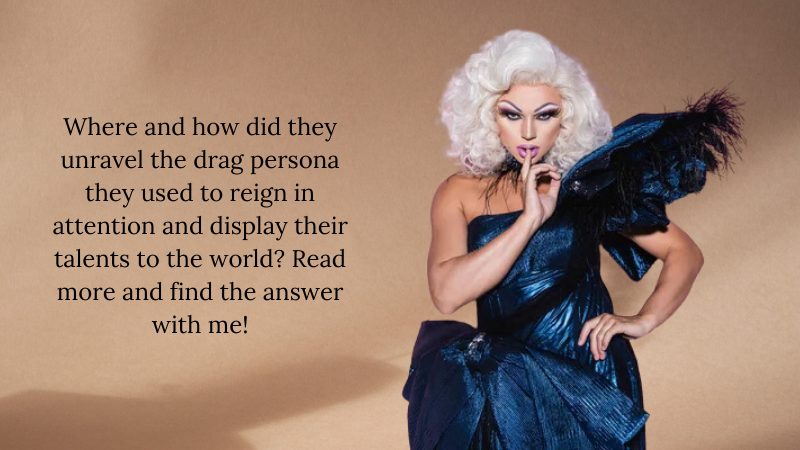
Who in these times is not familiar with the world of drag?
In this universe, there’s an endless barrage of drag performers with entertaining and unique personalities.
Obviously, those who perform make drag culture shine.
But have you ever wondered how every high-heeled, perfectly baked-faced drag performer snatched a spot in drag’s blinding stage?
Where and how did they unravel the drag persona they used to reign in attention and display their talents to the world?
Read more and find the answer with me!
Drag Culture: Then and Now
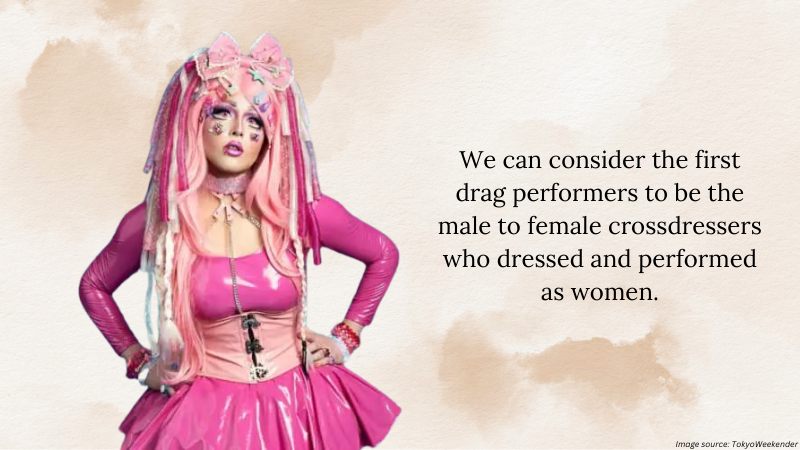
Drag has always had a fascinating and rich history.
Although it’s most prominent in the Western world in modern times, drag has roots in various cultures.
Take a guess on which cultures. If you answered Ancient Greece or traditional Japanese theater, you’re right.
No matter the culture, there’s one clear overlap.
We can consider the first drag performers to be the male to female crossdressers who dressed and performed as women.
More Than Just Entertainment
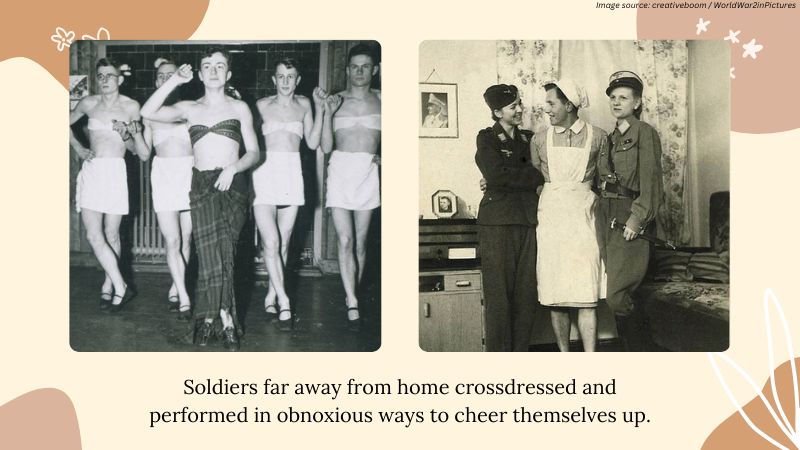
As many creatives will tell you, art makes us human.
Drag, as an art form, changed from being just an entertaining way to pass time.
For instance, soldiers far away from home crossdressed and performed in obnoxious ways to cheer themselves up.
Drag was not just entertaining. It was a coping mechanism.
A way for them to keep their minds off of the grim reality of war.
Aside from the psychological benefits of drag, it was also an efficient platform to go against restrictive (unfair) rules.
This is especially true for the LGBTQ+ community in the 19th century.
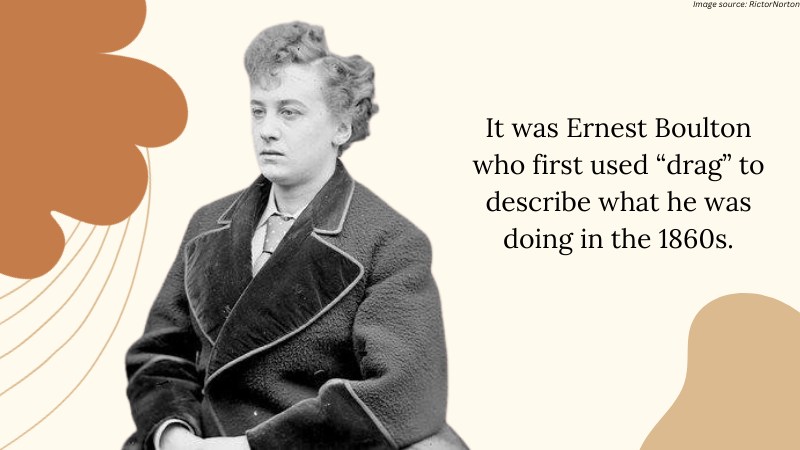
It was Ernest Boulton who first used “drag” to describe what he was doing in the 1860s.
In a sensational trial, he, along with Frederick Park, was tried in court.
Take a guess what these (allegedly) gay men did that made them so iconic.
They crossdressed while on trial! They did not show up as Ernest and Frederick.
They waltzed through the court as Stella and Fanny!
Drag in Mainstream Media
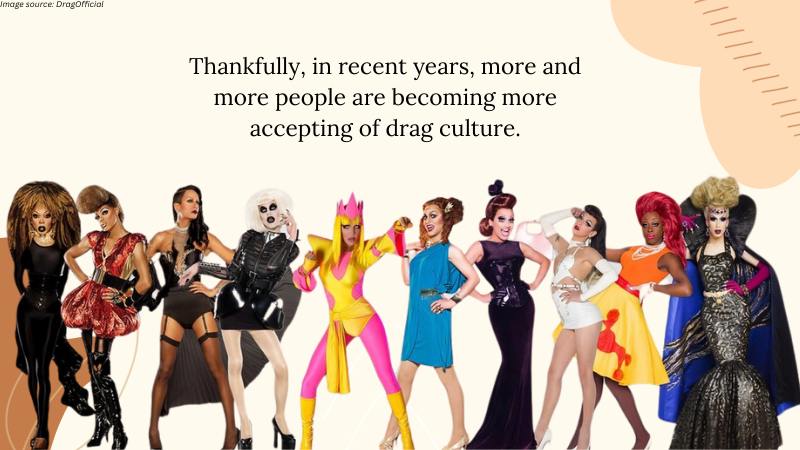
Thankfully, in recent years, more and more people are becoming more accepting of drag culture.
Where there was censorship in the past, there’s now visibility in the mainstream media.
For me, the most validating feat the media supported is considering drag as a niche art.
Today, who will dare call themselves a drag performer without talent and creativity?
These drag performers aren’t versed in just one talent either.
The current industry expects them to have many!
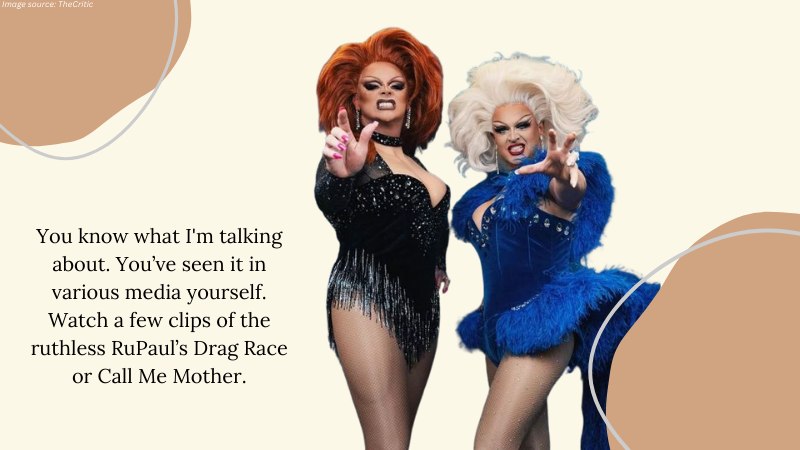
You know what I’m talking about. You’ve seen it in various media yourself.
Watch a few clips of the ruthless RuPaul’s Drag Race or Call Me Mother.
There are on-screen clashes (as what’s expected of highly talented people), yes.
But seeing drag on screen also influences society’s take on this art and its meaning.
Drag and the Crossdressing Community
First things first— drag is not exactly the same as crossdressing.
Drag is a category under crossdressing. All drag performers are crossdressers. But not all crossdressers are drag performers.
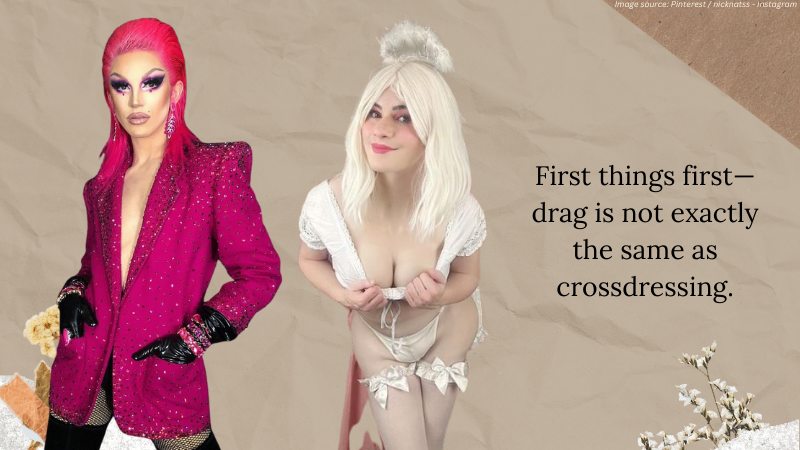
- Crossdressers can adapt any form of a woman that feels authentic and affirming.
She can be a stay-at-home mom from the 50s or a feminist in the 21st century who doesn’t care for men or bearing children.
Note that these are extreme examples.
There are also crossdressers who subtly present femme qualities or lean more on the androgynous side.
- In contrast, drag performers use inflated perceptions of that gender.
For instance, a drag queen will aggrandize what it means to be a woman. In the physical form, at least.
They will pick the “most womanly” shape, hair, and makeup, and exaggerate each element.
It’s not to mock, but to attract attention and amuse audiences.
Drag is almost always linked to performances and entertainment.
Crossdressing is more about personal identity and self-discovery.
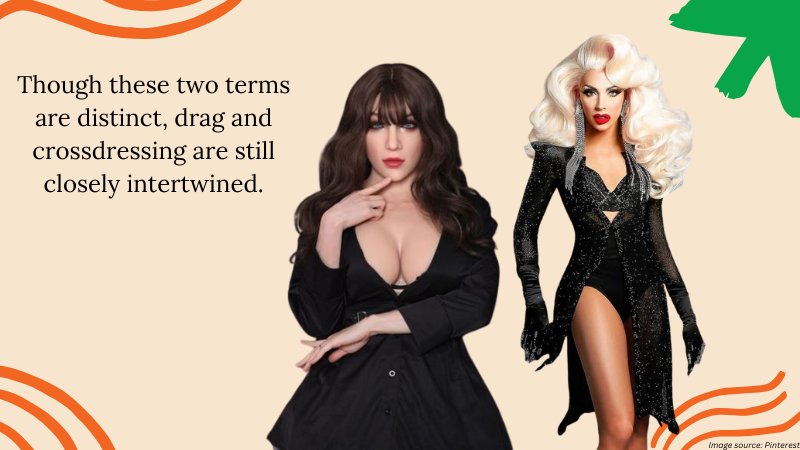
Though these two terms are distinct, drag and crossdressing are still closely intertwined.
Particularly, in the area of expressivity. Both drag and crossdressing communities highlight freedom.
The freedom to convey yourself as you like.
Primarily through clothing and appearance traditionally linked to your opposite gender.
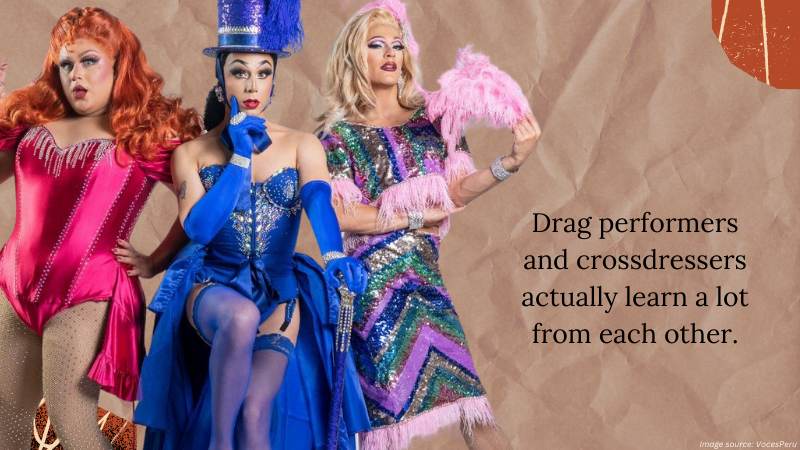
Drag performers and crossdressers actually learn a lot from each other.
Drag queens and kings may draw inspiration from the lived experiences of crossdressers.
The reverse is true.
Through these, both get a more profound understanding of the joys and pains of expressing gender in non-traditional ways.
Remember, each form of expression holds its own value and relevance.
So, it’s very crucial for respect and appreciation to be ever-present.
How Drag Performers Create Their Personas
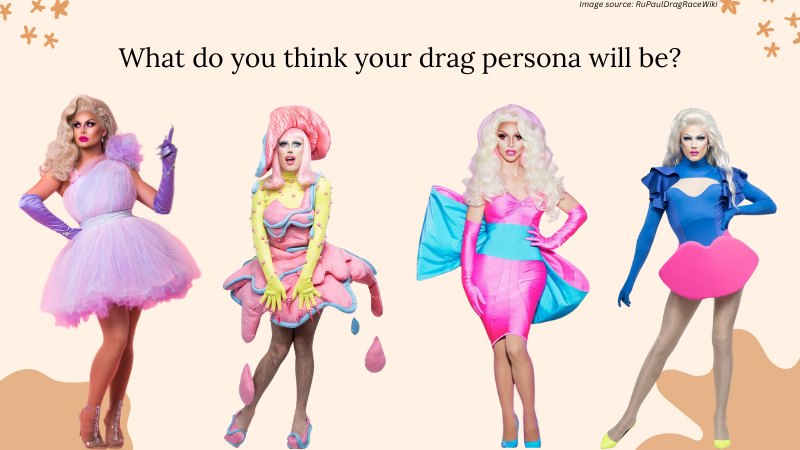
What do you think your drag persona will be?
For sure, you’ll think of something that connects to you on a personal level one way or another.
That’s exactly how drag performers build their drag characters.
Personal Experiences and Identity
What makes a person interesting? Their experiences.
Each of us had to go through different highs and lows, each thread creating the fabric of our lives.
Now, pair these personal experiences with drag performers’ creativity.
Drag performers use their past struggles and triumphs to fuel their shows.
They sprinkle bits and pieces of themselves in every act they share with their audiences.
This sincerity establishes a compelling drag character.
It also makes it easier to resonate with audiences and other onlookers.
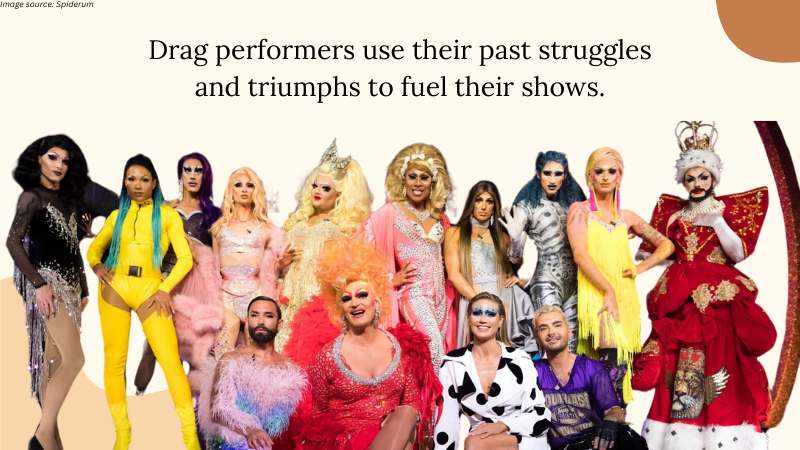
Most drag performers fish out inspiration from the pain they’ve experienced in life.
The general consensus is, that if you can laugh about it, it wouldn’t hurt as much.
When this pain is used on stage, it becomes a stepping stone to another chapter of the performer’s life.
It can strengthen resolve and embolden individuals to express themselves without holding back.
Unbarred drag performers present better acts.
It’s through this process that drag characters aren’t just riveting.
They’re also deeply meaningful.
The central theme remains, as you would have guessed, self-discovery and acceptance.
Through drag, anyone is free to explore with no map.
The treasures? Chancing on different facets of your identity.
Pop Culture and Icons
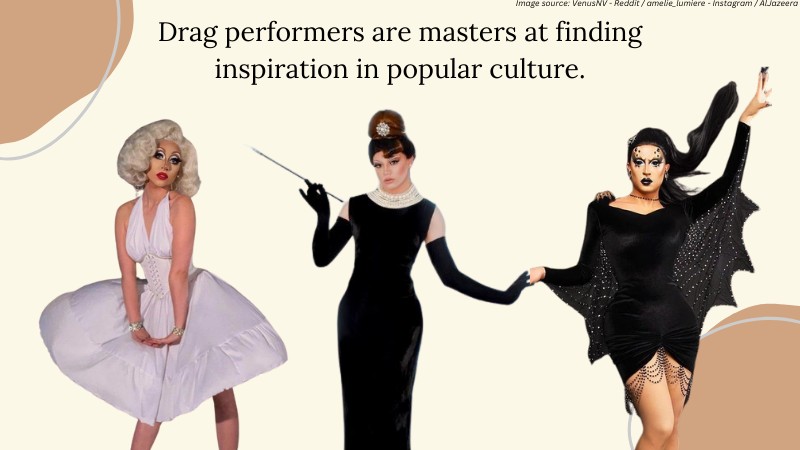
Drag performers are masters at finding inspiration in popular culture.
They know what’s trendy and what’s timeless.
Picking already iconic figures can garner a drag performer an immediate audience base.
But it’s not an easy feat to execute acts without being nitpicked.
The solution is to fish out characters a drag performer can flawlessly emulate.
They can be from movies, music, and even politics.
It’s not simply copying celebrities, historical figures, or fictional characters.
It’s reimagining, carefully choosing which features to include, emphasize, and downplay.
It’s necessary to breathe new life into these muses.
Only then will drag performers create characters that are truly theirs.
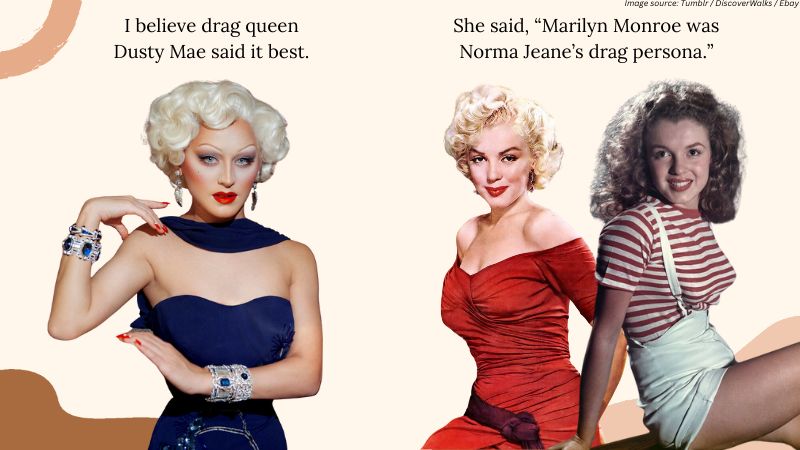
After this selection, performers step into the spotlight and poof!
Boundaries are shattered and social ideals are left at the entrance.
Enjoying drag is living in the moment and witnessing something extraordinary.
I believe drag queen Dusty Mae said it best.
She said, “Marilyn Monroe was Norma Jeane’s drag persona.” I don’t think she’s wrong!
That’s the kind of reimagination drag people need.
Reimagined characters that aren’t mere imitations.
They should be the 2.0 version and stand as powerful symbols of human individualism and liberty.
The artistry involved in transforming these inspirations into drag personas is no joke.
The process itself is tedious. From the meticulous curls of wigs,
the right foundation shade, the appropriate breast form size, and more.
Not to mention the movements, mannerisms, and voice inflections they need to master to make their act convincing.
Collaborations and Community
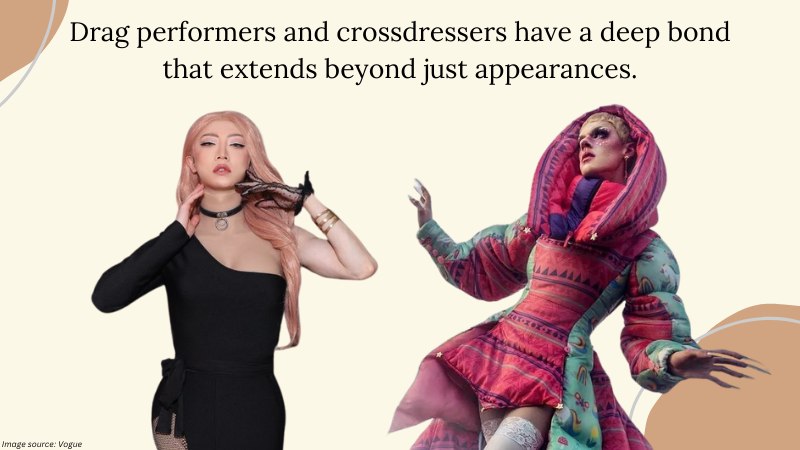
Drag performers and crossdressers have a deep bond that extends beyond just appearances.
They motivate and stand by each other.
They bond over how they express themselves and work to develop their own identities.
They give advice, motivate, and cultivate a welcoming environment.
An environment where everyone is free to explore who they are.
This network also helps them grow creatively.
It’s a band to share ideas and skills to shape artistic visions.
With such an environment, they’re unafraid to push way beyond their creative restrictions.
They are urged to challenge society’s opinions and redefine the standard.
These partnerships stimulate members.
Healthy collaborations can even change the public’s mindset on these groups.
The artists’ combined skills and expertise lead to stunning performances.
With continued mutual support, these performances are only expected to improve.
Within this community are companies that offer what drag performers and crossdressers need.
Dedicated manufacturers of crossdressing products like Roanyer support the communities in their endeavors.
These companies offer tools and resources to bring the members’ creative visions to life.
Conclusion
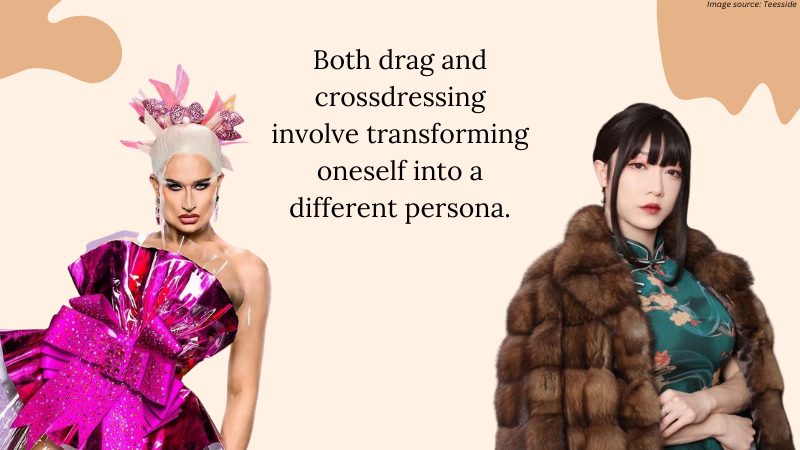
Let’s take a moment to reflect on the ways in which drag performers discover their muses.
These artists draw inspiration from a myriad of sources.
Whether it be iconic divas, personal experiences, or even fictional characters.
The process of finding inspiration is personal.
Once done, it’ll allow drag performers to showcase their talents and creativity.
Both drag and crossdressing involve transforming oneself into a different persona.
Both also blur the lines of gender and societal norms.
When you choose to try drag or crossdressing, you liberate yourself.
You also give yourself the opportunity to challenge old beauty and identity standards.
Creativity, individualism, and self-expression are the cornerstones of drag and crossdressing.
These values are not only celebrated but also encouraged within these communities.
Welcome your creativity, stress your individuality, and showcase your unique talents.
Soon, you’ll find out that if you do, it’ll be a piece of cake for you to shine on any stage.
- Becoming the Perfect Crossdressing Slut Wife: A Comprehensive Guide
- How to Win Any Crossdresser Sexy Legs Contest
- Your Most Comprehensive Guide to DIY Crossdresser Porn
- A Comprehensive Guide on Nailing the Perfect Soft Boy Aesthetic
- 10 Tips for a Superstar Pride Celebration 2024
- The Big Booty Femboy Trend: 10 Irresistible Bootylicious Looks
Established in 2009, We are a recognized manufacturer and seller of professional crossdressing products.
It is our aim to become not just the most creative manufacturer but also a very considerate seller, as we provide the best quality products for crossdressers all around the world.
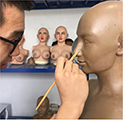
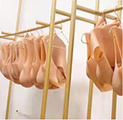



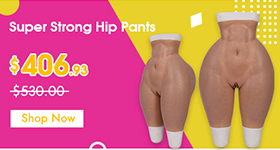

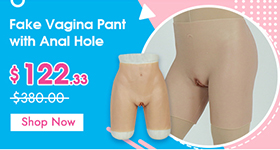

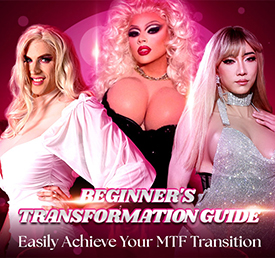

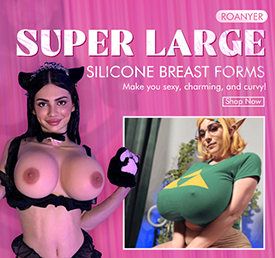
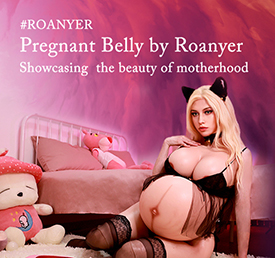


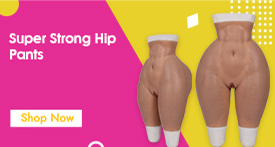
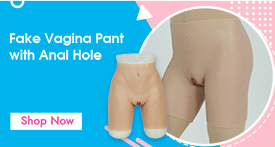

 Breast Forms
Breast Forms  Body Suit
Body Suit  Realistic Mask
Realistic Mask  Femini Girdle
Femini Girdle Hip & Butt Enhancement (8)
Hip & Butt Enhancement (8) Penis Prosthesis
Penis Prosthesis Fake Muscle
Fake Muscle Bikini
Bikini  Wig
Wig  Corsets
Corsets Course
Course service@roanyer.com
service@roanyer.com +8618652200711
+8618652200711 Facebook
Facebook YouTube
YouTube Twitter
Twitter Instagram
Instagram




